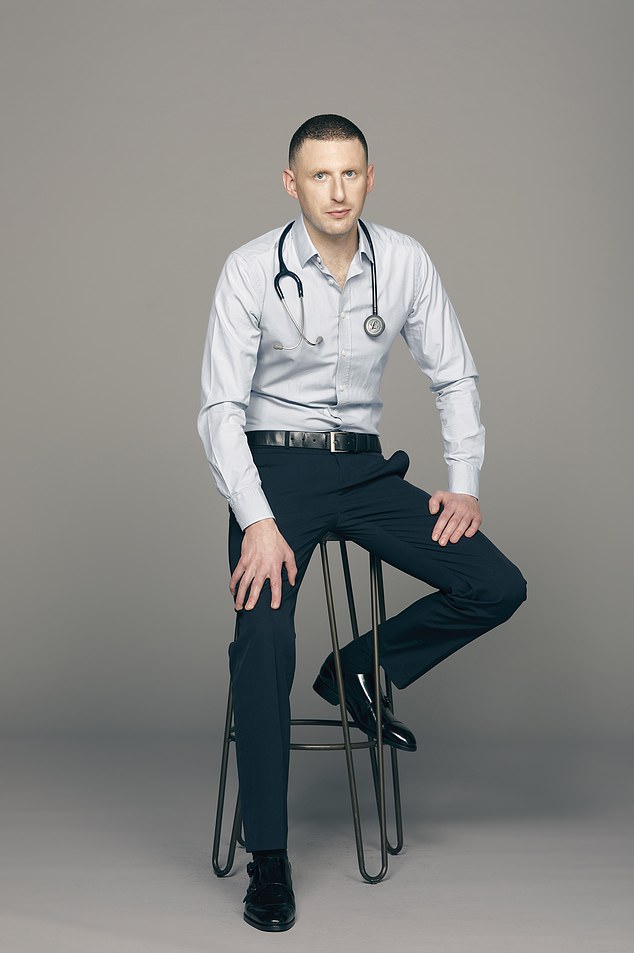DR MAX PEMBERTON: Even celebs need space to grieve – we must respect that
When I was a teenager I loved watching Friends and my favorite Friend by far was Chandler Bing, the neurotic but lovable character brought to life by Matthew Perry.
As I grew up, left home and went to college, the sitcom remained an important part of my life, as it was for many.
So Perry’s death just over a week ago came as a shock to me and millions of others who felt like they knew him.
Tragically, the 54-year-old was found dead in his hot tub after a decades-long battle with drug and alcohol addiction.
The exact cause of death has yet to be given — Los Angeles police have said the investigation is “ongoing” — but the actor is said to have been “in a good place” in recent weeks.
Matthew Perry, 54, who played Chandler Bing on Friends, was found dead in his hot tub after a decades-long battle with drug and alcohol addiction
At times like these, it’s normal to look to others as lightning rods for our sadness or grief, and it was inevitable that people would wait for the remaining cast members in Friends to deliver a fitting tribute that would sum up all our feelings.
This took longer than fans expected. And as time passed with no comments or social media posts from Jennifer Aniston, Courteney Cox, Matt LeBlanc, Lisa Kudrow, and David Schwimmer, I noticed more and more online comments criticizing them for not speaking out.
I felt the opposite. I was glad that instead of saying something unkind or mean just because the audience asked for it, they kept their silence.
For ten years – a lifetime in Hollywood – the six stars of Friends worked together on ten seasons of the show that took them from unknowns to household names around the world.
In a groundbreaking move for their industry, they famously united to negotiate equal pay – ultimately totaling $1 million per episode.
But it wasn’t just a professional friendship. Key to the show’s success was its original pitch to capture that stage of life where, as a young person entering adulthood, “your friends are your family.”
And off-screen, it seemed the cast found a similar sense of comfort in each other.
Reflecting on the global phenomenon that the sitcom became, Lisa Kudrow said, “Fame doesn’t heal what’s going on inside you, no matter how you feel about yourself. The lucky thing was that the six of us had each other to get through it.”
In the days after Perry’s death, it seems that Kudrow, Aniston, Cox, LeBlanc and Schwimmer were so upset by the news, so overwhelmed, so incapacitated by their grief, that they struggled to put into words how they felt.

Dr. Max was happy that the cast of Friends, instead of saying something unkind or mean just because the audience asked for it, initially kept quiet about Perry’s untimely death.
It reminded me of the criticism the royal family received for not behaving the way the public wanted after Princess Diana’s death.
Years later, when I heard from William and Harry what it was really like for them and the utterly crushing grief they experienced, while so many groaned at not having seen members of the Royal Family, I thought deeply.
No, the Royals weren’t much visible in the immediate aftermath, but perhaps that was because they were trying to comfort two heartbroken young boys at home.
In the midst of grief, the public is not at the forefront of the minds of public figures in pain. Nor should they be. Let those who truly knew and loved Perry grieve in their own way.
The Friends cast eventually released a shared statement, saying, “We were more than just castmates. We are a family. There is so much to say, but now we are going to take a moment to grieve and process this unfathomable loss.”
They later gathered to say their final goodbyes to Perry at his funeral, which was held Friday in Los Angeles. Aniston, Cox, Kudrow and Schwimmer arrived together and were later seen outside the cemetery having a somber conversation with LeBlanc.
As LeBlanc said, “There are only five people in the world besides me who know exactly what it was like to be on Friends.” Now that number is four.
As Perry’s colleagues, collaborators and – as they say – true friends, their grief is personal and entirely their own. They don’t owe us anything.
HANDS OFF DOCTOR DATA
With everything the NHS has to worry about at the moment – a crippling staffing crisis, escalating waiting times, budget deficits, poor care and a cataclysmic fall in public confidence – I was surprised that last week it felt the need to issue guidance on sexting.
Yes, rather than tackling the plight of patients who cannot get a GP appointment or tackle ambulance queues outside A&E, the NHS felt it was more important to focus on the social media used by doctors and dentists.
Are NHS bosses completely deaf to the cacophony of real concerns from patients and staff?
The guidelines, published by NHS training organization Higher Education England (HEE), urge junior doctors and dentists to avoid dating apps while at work, in case they match with patients or colleagues and therefore damage reputation.
It advises against sending sexual messages or images – or, if they do, keeping their faces out of it!
I can’t believe HEE interferes in the love lives of its staff to this extent. Sending unsolicited photos of yourself is inappropriate, no matter who you are.
I dare say that the kind of person who would do this would not be deterred by ‘guidance’ telling them not to. Doctors are not crazy.
We’re well aware that if you open a dating app while you’re at work, there’s a chance you’ll see patients or colleagues on it, and that’s something we take into account before swiping right!
‘Superwoman’ Nicola Horlick has spoken about her husband’s death from prostate cancer last year, and wishes Britain was better at diagnosing it.
It is the most commonly diagnosed form of the disease here and more men die from breast cancer than women.
More than double the money goes to breast cancer research compared to prostate cancer, but that is only part of the problem.
When I worked in a urology department, I was shocked by how many men diagnosed with advanced prostate cancer had postponed seeing a doctor.
It’s because of the fear of treatment – and possibly remaining impotent – which becomes a kind of denial.
The sense of loss women may feel when diagnosed with breast cancer or undergoing a mastectomy is well known, and psychotherapy is available specifically for this.
Men do not experience the same sensitivity with prostate treatment, which could affect their sense of masculinity.
When things like impotence are discussed, it’s just cold statistics, never the reality of what sex is like after treatment.
Why are men expected to get on with it? We criticize men for not talking about their feelings, but we don’t offer them the opportunity to do so.
I think part of tackling men’s reluctance to come forward sooner is talking honestly about their fears – and offering the right emotional support.
DR MAX PRESCRIBES…
Watching stars

Pause, look up and admire the Cosmos at Broughton Sanctuary, on the edge of the Yorkshire Dales National Park
After a cozy dinner around the campfire, admire the night sky with the help of powerful stargazing equipment and enjoy an educational sky tour with an astronomer at Broughton Sanctuary, on the edge of the Yorkshire Dales National Park.
It’s the perfect opportunity to pause, look up and marvel at the cosmos. Until March 2024, £36pp, avalonwellbeing.com/classes/.
Most appointments at GP practices these days do not involve a doctor, according to the latest figures.
Campaign group Silver Voices said: ‘What people want is a GP who can look at their overall situation, but instead we see people being diverted every time.’
It’s hard not to disagree. Cut back to save costs.
